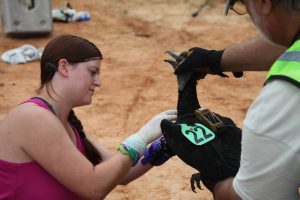Buzzard protection focus of Savannah River Ecology lab study
Meg Mirshak
Augusta Chronicle
December 25, 2013

Birds that get their sustenance from eating dead animals are the focus of a local study aimed at keeping them alive.
Vultures, or scavenging birds that feed on carrion, have been on the decline in recent decades in many places across the globe. Jim Beasley, an assistant research scientist at the Savannah River Ecology Laboratory, wants to make sure that buzzards stick around in Georgia and South Carolina.
“Vultures are one of the species people tend to turn a blind eye to. They don’t have a lot of relevance to people,” said Beasley, one of several scientists leading a study that’s looking for a method to protect vultures.
“(Vultures) play a very important role in recycling dead materials which also plays a role in reducing disease-transmission risks,” he said.
Airports have proven to be dangerous locations for buzzards because of the methods sometimes used to disperse them, Beasley said.
An acoustic hailing device – a long-range loud speaker that sends a directional-specific sound beam and is sometimes used by the U.S. Navy to hail ships – could be the nonlethal solution to the problem.
In the past year, Beasley’s team has trapped about 100 Black and Turkey Vultures at Savannah River Site. Most were tagged with wing tags, and about 20 received solar-powered GPS transmitters that send the buzzards’ location and altitude nearly every minute. Another 100 to 200 will be marked in coming months, in addition to ducks and seagulls.
“All the species we’ve selected are risk-specific for collisions with aircraft,” Beasley said.
An acoustic hailing device will be used to call back the tagged birds to determine what proportion of vultures return and if the devices are useful to call birds away from airports without killing them. Beasley’s research team is collaborating with the USDA National Wildlife Research Center and the Federal Aviation Administration.
Protecting vultures in Georgia and South Carolina could help prevent an ecological crisis like that in other parts of the world where some vultures were nearly extinct, Beasley said. The California condor found on the west coast of the U.S. narrowly escaped extinction in the 1980s. In Asia, vultures dramatically died off because they were eating livestock treated with a drug that has since been banned because of the declining vulture population.
